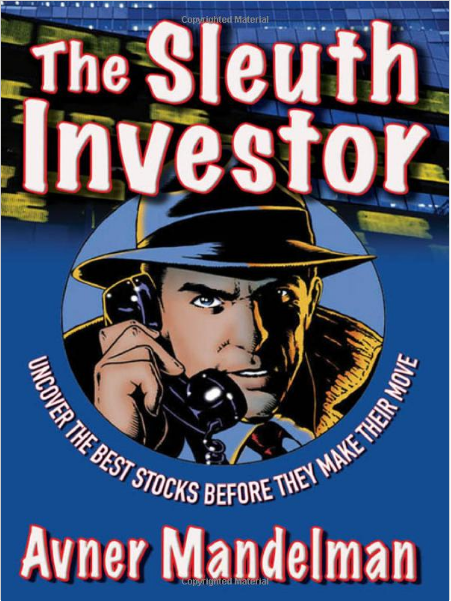The estimated reading time for this post is 4 seconds
Note: Highlight to Tweet is enabled - Just highlight text to easily share the selected content to Twitter!
The Sleuth Investor by Avner Mandelman is a different kind of investment book than most other financial books which cover more traditional aspects of investing. This book focuses squarely on what a small investor (or firm) should be doing in order to gain an advantage against the rest of the market. As the title depicts, the advantage investors with a smaller capital base can gain is by physically “sleuthing” the target investment company. Because many analysts and larger investment firms do not do much physical investigation, one can theoretically gain an advantage by doing the more difficult work.
The author runs an investment firm called Giraffe Capital , and claims to have used the techniques he presents in the book to build great wealth over time. The Sleuthing technique focuses on three major areas – People, Product and Place/Periphery. Each area has at least one chapter dedicated to it, and examples that use fictitious names as to not call out any firms. In essence, people are individuals inside and outside of the company that may be important to talk to or even watch what they do. The book rides a slippery slope between what is legal and not legal, and covers some of this in the book. Some may find this type of work overboard, but I think it has some merit, as if an investor can glean information before others an edge can be gained. This is more true for smaller companies that are as widely followed – Microcaps, SmallCaps etc… Product is what it appears to be, a necessary investigation of the product itself, which many investors do not analyze before making an investment. The finally, Place/Periphery is a look at how to analyze the property or physical assets of a company. All three of these major areas should be well understood by an investor before making an investment and the book covers many aspects of how to go about doing so.
The case that the Mandelman makes reminds me a lot of what Ian Cassel of MicroCapPub speaks about often:
If you don’t have the time or ability to know your investments better than most, then you should be more diversified.
— MicroCapClub (@iancassel) January 22, 2015
An individual investor must gain an advantage in the market, and usually this is done through finding companies that are under followed, but now another tool can be added, and that’s to perform physical sleuthing to understand the company better than anyone else. I’ll admit that I have been lacking in this department, but it makes sense. I tend to have a little bit of apprehension to speaking with executive management as they will try to “sell” you on the company, and won’t necessarily be a great source of information to act upon. However, I think that it is now important to have some conversations with executives, but with the understanding that it’s important to speak with and question many other people to discover the full story about a possible invest-able company.
Conclusion
This was a fairly quick read, and certainly worth the read. It’s not a traditional investing book, which is what I appreciated. More tools can be added to the research phase, and can lead to primary information that other investors do not have yet that can be acted upon. I’ve already started to use some techniques from the book, and using some of the questions laid out. The book is pretty hard core on the sleuthing, so not everyone will want to act upon all of the techniques, but choosing to use some of the techniques will certainly help provide an edge.
Buy The Sleuth Investor: Uncover the Best Stocks Before They make Their Move at Amazon.com
General Disclaimer
The content contained in this blog represents the opinions of Ray Bonneau and RayBonneau.com. Ray Bonneau or persons posting on RayBonneau.com may hold either long or short positions in securities of various companies discussed in the blog. The commentary in this blog in no way constitutes a solicitation of business or investment advice. Readers should do their own homework and research when making investment decisions. The blog is intended solely for the entertainment of the reader, and the author.
Ray Bonneau is a participant/publisher in certain affiliate programs, including Amazon's Associates Program. Ray Bonneau will earn a small commission when a link to an affiliate site is clicked and a purchase is made. Affiliate programs help Ray Bonneau earn money to pay for this blog. Readers do not pay any extra money when clicking and using affiliate links on RayBonneau.com

